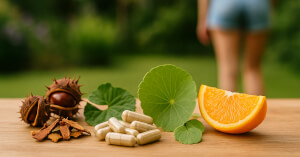
Bioflavonoids
Bioflavonoids are plant-based antioxidants that support circulation, immune function, and enhance the effects of vitamin C.
Bioflavonoids, also known simply as flavonoids, are a group of antioxidant compounds found in fruits, vegetables, and herbs. They are especially abundant in citrus fruits and colorful plant-based foods.
Often used in supplements as “citrus bioflavonoids”, they include well-known compounds such as quercetin, rutin, and hesperidin. These substances are valued for their antioxidant, anti-inflammatory, and capillary-protective properties.
Bioflavonoids are commonly combined with vitamin C in formulations to support immune health, vascular integrity, and reduce oxidative stress.
Other names & forms of Bioflavonoids supplement : flavonoids, citrus bioflavonoids, plant polyphenols, flavones, flavonols, rutin, hesperidin, quercetin complex
Possible Benefits
Bioflavonoids support a wide range of physiological functions, primarily through their antioxidant and anti-inflammatory actions. They are often used to complement vitamin C and enhance vascular protection.
- Strengthen capillaries and support venous circulation, especially in cases of fragility or varicose veins.
- Enhance immune system response when combined with vitamin C.
- Provide antioxidant defense against oxidative stress and cellular damage.
- Support anti-inflammatory pathways in chronic inflammatory conditions.
- May reduce allergy symptoms through mast cell stabilization and histamine modulation.
Side Effects
Bioflavonoids are generally well tolerated. High doses may occasionally cause digestive discomfort or mild headaches. Allergic reactions are rare.
Interactions
Bioflavonoids may interact with blood pressure medications, anticoagulants, or antibiotics. Combining with Vitamin C enhances absorption and efficacy.
Precautions
People on blood thinners or with bleeding disorders should use caution, especially with high-dose flavonoid supplements like quercetin or rutin. Pregnant or breastfeeding individuals should consult a healthcare provider before use.
Studies
These studies provide scientific insights into Bioflavonoids benefits:
A 2017 review highlighted the vascular and anti-inflammatory benefits of citrus bioflavonoids in chronic venous disease.
Other studies show synergistic effects with vitamin C in enhancing immune response and reducing capillary fragility.
Disclaimer: This page is for educational purposes and does not replace medical advice. If you're pregnant, have a condition, or take medication, speak with a qualified professional.
Related Articles








